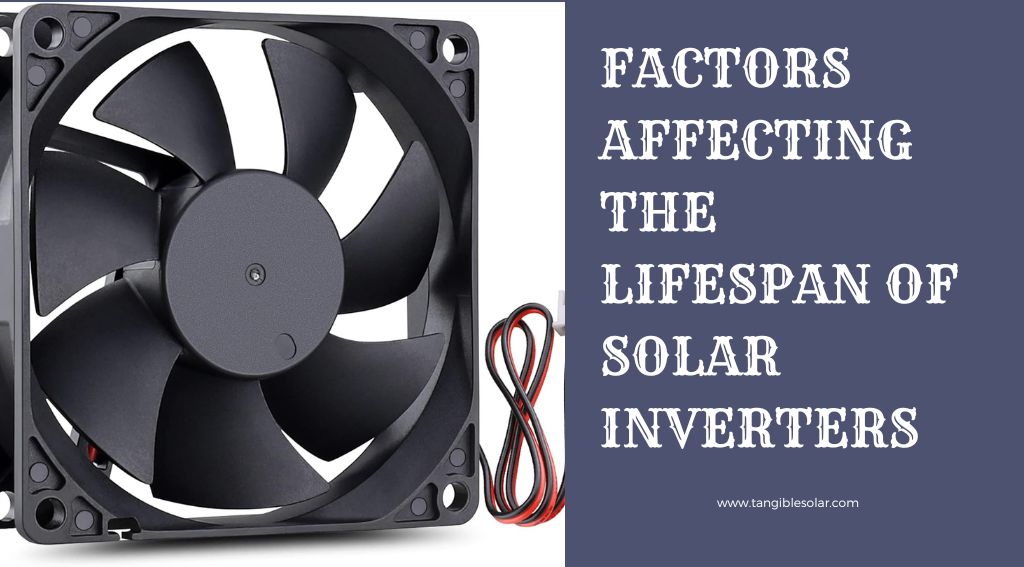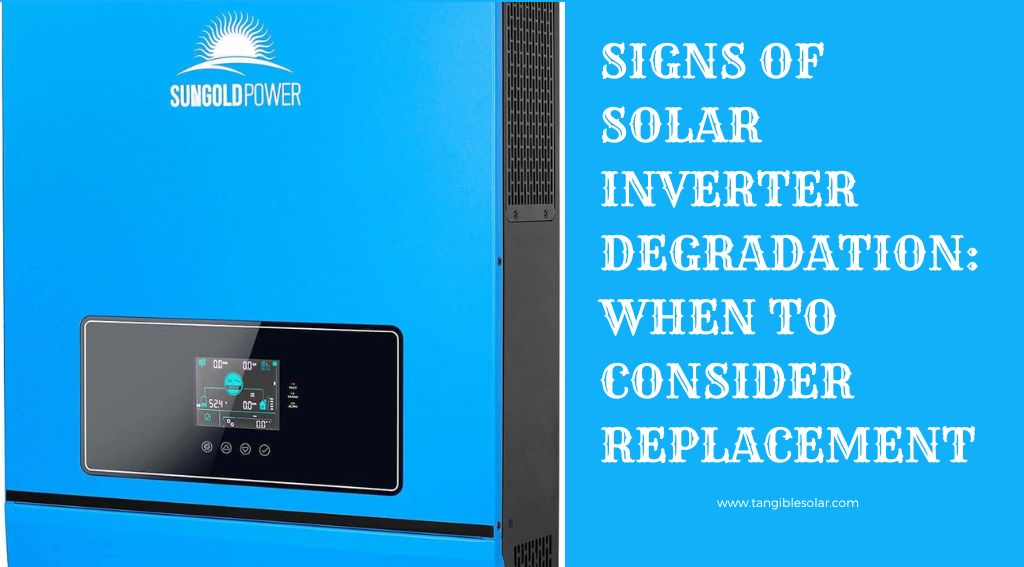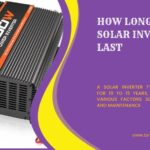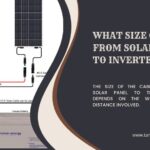How Long Does Solar Inverter Last?
A solar inverter typically lasts between 10 and 20 years. Weather conditions, normal wear and tear, and technological advancements can all have an impact on inverters over time. Therefore, it is important to consider the lifespan of the inverter when investing in a solar system. We will delve into the factors that affect the lifespan of a solar inverter and discuss ways to prolong its longevity.
By understanding the lifespan and maintenance requirements, you can make informed decisions when it comes to choosing and maintaining your solar inverter.
Solar Inverters: A Key Component Of Solar Power Systems
When it comes to harnessing the power of the sun, solar inverters play a crucial role in making solar power systems functional. These components are the brains of a solar energy system, turning the direct current (DC) power that solar panels produce into the alternating current (AC) electricity that powers our homes and businesses. In this section, we will delve into the importance of solar inverters and how they maximize energy production in solar systems.
What Is A Solar Inverter And Its Role In Converting DC Power To AC Power?
A solar inverter is an essential piece of equipment in any solar power system. Its main job is to transform the DC power that solar panels generate into AC power that is compatible with the electrical grid and can power our appliances and gadgets.
Here is a breakdown of how the conversion process works:
- Solar panels absorb sunlight and convert it into DC electricity.
- The solar inverter then receives the DC electricity that the solar panels have generated.
- The solar inverter converts the DC power into AC power, which is the standard form of electricity used in our homes and businesses.
- The AC power is then directed to our electrical systems, where it can be utilized to power various devices and appliances.
The DC power that solar panels produce would be useless for powering our homes and businesses without a solar inverter. Solar inverters act as the intermediary between the solar panels and our electrical systems, ensuring a seamless conversion process.
Importance Of Solar Inverters In Maximizing Energy Production In Solar Systems
The importance of solar inverters goes beyond facilitating the conversion of DC power to AC power. They also play a crucial role in maximizing energy production and ensuring the efficiency of solar systems.
Here are some key reasons why solar inverters are vital for optimizing energy production:
- MPP Tracking: Solar inverters use Maximum Power Point (MPP) tracking technology, which ensures that the solar panels operate at their maximum efficiency levels. This technology allows the solar panels to adjust their electrical output based on factors like shading, temperature, and other environmental conditions, resulting in optimized energy production.
- Grid Interaction: Solar inverters facilitate the connection between solar power systems and the electrical grid.
- Data Monitoring and Analysis: Many modern solar inverters come equipped with advanced monitoring systems that collect data on the solar power system’s performance. This data can be used to identify any issues or inefficiencies and make necessary adjustments to improve energy production.
In conclusion, solar inverters are a vital component of any solar power system. They enable the conversion of DC power to AC power and play a crucial role in maximizing energy production and ensuring system efficiency. Without solar inverters, solar panels would not be able to power our homes and businesses effectively.
Factors Affecting The Lifespan Of Solar Inverters

When investing in a solar energy system, it is crucial to consider the lifespan of the various components, including the solar inverters. The solar inverter is an essential part of the system that converts the direct current (DC) generated by the solar panels into usable alternating current (AC) for your home or business. Several factors can affect the lifespan of solar inverters, such as the quality of the inverters, environmental factors, and regular maintenance. Understanding these factors can help you make informed decisions when choosing a solar inverter for your solar energy system.
How Does a Solar Inverter Synchronize With Grid
Quality Of Solar Inverters And Its Impact On Longevity
When it comes to solar inverters, quality plays a significant role in determining their lifespan. High-quality inverters, usually manufactured by reputable and trusted brands, are designed to withstand various operating conditions and provide reliable performance over an extended period. On the other hand, low-quality inverters, often sold at cheaper prices, may experience premature failures and shorter lifespans. Investing in a high-quality solar inverter may initially cost more, but it can offer long-term benefits in terms of reliability, efficiency, and durability.
Degradation Of Solar Inverters Over Time Due To Environmental Factors
Solar inverters are exposed to various environmental factors that can affect their lifespan. Extreme temperatures, excessive humidity, and exposure to sunlight can contribute to the degradation of inverters over time. High temperatures, for instance, can cause internal components to degrade faster and increase the risk of malfunction. To mitigate the impact of environmental factors, it is essential to install solar inverters in well-ventilated areas and provide proper shading or cooling mechanisms when necessary. Additionally, regular inspections and maintenance can help identify and address any potential issues caused by environmental factors, ensuring the longevity of your solar inverters.
Regular Maintenance And Monitoring To Ensure Optimal Performance
Proper maintenance and monitoring are key to ensuring the optimal performance and longevity of solar inverters. Regular inspections by qualified technicians can help identify any signs of wear and tear, loose connections, or other potential issues that may affect the inverters’ performance. Additionally, monitoring systems can provide real-time data about the inverters’ functioning, allowing for the timely detection of any anomalies. By conducting regular maintenance and monitoring activities, you can extend the lifespan of your solar inverters while maximizing their efficiency and performance.
Average Lifespan of Solar Inverters: How Long Can You Expect Them To Last?
When investing in a solar energy system, it’s essential to consider the lifespan of the individual components. One critical component is the solar inverter. The solar inverter is responsible for converting the direct current (DC) generated by your solar panels into the alternating current (AC) used in your home. But how long can you expect a solar inverter to last
Industry Standards And Warranties: What Manufacturers Promise
Manufacturers of solar inverters provide warranties to assure customers of the durability and reliability of their products. These warranties typically range from 5 to 12 years, depending on the manufacturer and the type of inverter. However, it’s important to note that the warranty period does not necessarily reflect the actual lifespan of the inverter. It simply guarantees that the manufacturer will repair or replace the inverter within the warranty period if it fails due to manufacturing defects or faults.
Typical Lifespan Of Various Types Of Solar Inverters
While the warranty period provides some insight, it’s also crucial to understand the typical lifespan of different types of solar inverters. Here’s a breakdown:
| Type of Solar Inverter | Typical Lifespan |
| String inverters | 10-15 years |
| Microinverters | 15-20 years |
| Central inverters | 20-25 years |
It’s worth noting that these figures represent an approximation based on industry observations. The actual lifespan of a solar inverter can vary depending on several factors.
Factors Influencing The Actual Lifespan Of Solar Inverters
Several factors can influence the actual lifespan of a solar inverter:
- Quality of the inverter: Higher-quality inverters often have a longer lifespan compared to lower-quality ones. Investing in a reputable and reliable brand can contribute to a longer-lasting inverter.
- Maintenance and care: Regular maintenance and proper care can help extend the lifespan of your solar inverter. Keeping it clean, addressing any issues promptly, and scheduling regular inspections can all contribute to its longevity.
- Environmental conditions: Harsh weather conditions, extreme temperatures, and exposure to moisture or dust can all impact the lifespan of a solar inverter. Inverters installed in areas with mild climates and minimal exposure to these conditions tend to last longer.
- System design and sizing: Proper system design and sizing play a crucial role in ensuring the longevity of your solar inverter. Oversizing or undersizing the inverter for your solar panel system can strain its components and lead to premature failure.
By considering these factors and choosing a high-quality inverter, you can maximize the lifespan of your solar inverter and enjoy the benefits of solar energy for many years to come.
Signs of Solar Inverter Degradation: When to Consider Replacement?

Identifying Common Signs Of Declining Performance In Solar Inverters
Solar inverters are essential in converting the direct current (DC) energy from your solar panels into the alternating current (AC) electricity that powers your home. However, like any electronic device, solar inverters can degrade over time, affecting their performance and efficiency. It’s important to be able to identify the signs of a declining solar inverter to address any issues promptly, preventing further damage and potential loss of energy production.
Here are some common signs that may indicate your solar inverter is experiencing degradation:
- Decreased energy production: If you notice a sudden drop in your solar system’s energy production, it could be a sign of an underperforming inverter. Monitoring your system’s output regularly will help you spot any significant fluctuations.
- Inconsistent or unstable output: An inverter that is nearing the end of its lifespan may produce erratic or unstable AC power. This can result in appliances malfunctioning or experiencing intermittent power interruptions.
- Strange noises or smells: unusual buzzing sounds or burning smells coming from your inverter could indicate internal component failures or overheating. If you notice any of these signs, it’s crucial to take action promptly to prevent further damage.
- Visible physical damage: A visual inspection of your inverter can reveal signs of deterioration, such as cracked casing, loose connections, or corrosion. These physical damages may affect the inverter’s performance and longevity and should be addressed immediately.
- Error messages or fault codes: Pay attention to any error messages or fault codes displayed on your inverter’s screen. These alerts are designed to inform you about potential issues with the inverter’s operation and should not be ignored.
Importance Of Regular Monitoring And Maintenance In Detecting Issues
Regular monitoring and maintenance of your solar inverter are essential to ensure optimal performance and detect potential issues before they escalate. By implementing a proactive approach, you can minimize energy losses and avoid costly repairs or replacements.
Here are some reasons why regular monitoring and maintenance are crucial:
- Early problem detection: By regularly monitoring your solar inverter’s performance, you can spot any abnormal behavior or declining efficiency early on. This allows you to address the issue promptly, preventing further degradation and optimizing energy production.
- Increased energy yield: A well-maintained inverter operates at peak efficiency, maximizing the amount of electricity your solar panels generate. Regular maintenance can help identify and rectify any factors that may be compromising your system’s energy yield.
- Extended lifespan: Timely maintenance, such as cleaning or replacing air filters, inspecting electrical connections, and checking for signs of wear, can contribute to prolonging the lifespan of your inverter. This helps you get the most out of your investment and reduces the need for premature replacements.
- Data-driven insights: Monitoring your inverter’s performance provides valuable data that can be analyzed and used to optimize your overall solar system’s efficiency. This data can help you identify patterns, track energy production, and make informed decisions to improve your system’s performance.
When To Consider Replacing A Solar Inverter Instead Of Repairing It
While some issues with solar inverters can be resolved through repairs, there are certain situations where replacement may be a more practical option.
- Age and warranty: Solar inverters typically come with warranties ranging from 5 to 12 years. If your inverter is approaching or surpassing the warranty period, it may be more cost-efficient to replace it instead of investing in extensive repairs.
- Significant damage or failure: In the event of severe physical damage, internal component failures, or a complete inverter failure, replacement may be the best course of action. These situations often require expensive repairs, making it more economical to opt for a new, reliable inverter.
- Technological advancements: Solar technology is constantly evolving, with new inverters offering improved efficiency, performance, and advanced features. If your existing inverter is outdated and lacks the capabilities of newer models, upgrading to a more technologically advanced inverter may provide long-term benefits.
- System expansion or changes: If you’re planning to expand your solar system or make significant changes to your energy needs, it may be necessary to replace your existing inverter. Consult with a qualified solar professional to ensure your inverter is compatible and capable of meeting the revised energy demands.
Extending The Lifespan Of Solar Inverters: Best Practices For Longevity
Solar inverters play a critical role in converting the direct current (DC) generated by solar panels into usable alternating current (AC) electricity for our homes and businesses. As an essential component of any solar power system, it is important to ensure the longevity and optimum performance of solar inverters. In this article, we will explore the best practices for extending the lifespan of solar inverters.
Importance Of Proper Installation And Positioning Of Solar Inverters
Proper installation and positioning of solar inverters are crucial to maximizing their lifespan and performance. Here are some key considerations:
- Choose a suitable location.
Place the inverter in a well-ventilated area with ample space for airflow to dissipate heat. Avoid installing the inverter in areas with direct sunlight, excessive dust, or moisture. This will help prevent overheating and potential damage.
- Follow manufacturer guidelines:
Refer to the manufacturer’s installation guidelines for specific requirements regarding mounting, orientation, and clearances. Adhering to these guidelines ensures that the inverter operates within its designed specifications.
- Use proper wiring and connectors.
Ensure that the wiring and connectors used for the installation are of good quality and capable of handling the current and voltage requirements. Faulty or inadequate wiring can lead to performance issues and may shorten the lifespan of the inverter.
Tips For Regular Cleaning And Maintenance To Prevent Degradation
Regular cleaning and maintenance are essential to prevent dirt, debris, and environmental factors from affecting the efficiency and lifespan of solar inverters. Consider the following tips:
- Clean the exterior.
Regularly inspect and clean the exterior of the inverter, removing any dust, leaves, or debris that may have accumulated. A soft brush or cloth can be used to gently clean the surface. Avoid using abrasive materials that may cause damage.
- Inspect and clean the vents.
Check the vents of the inverter for any obstructions and ensure they are free from dust or debris. Blocked vents can hinder proper airflow, leading to overheating and potential damage.
- Monitor for excessive heat.
Regularly check the temperature of the inverter and its surroundings. If the inverter feels excessively hot or if the temperature exceeds the manufacturer’s specified limits, consult a professional to address the issue.
Utilizing Advanced Technologies To Optimize Performance And Lifespan
Advancements in technology have led to the development of features and systems that can enhance the performance and lifespan of solar inverters. Consider the following options:
| Option | Description |
| Maximum Power Point Tracking (MPPT) | MPPT technology lets the inverter get the most power out of the solar panels by constantly tracking their best operating point. This makes sure that the energy is converted efficiently. |
| Anti-islanding protection | Anti-islanding protection is a safety feature that deactivates the inverter during a power outage, preventing it from sending power back to the grid and potentially endangering utility workers. |
| Remote monitoring | Remote monitoring systems allow users to keep track of the performance and health of their solar inverters. Real-time alerts and notifications can help identify and address any issues promptly. |
By leveraging these advanced technologies, solar inverters can operate more efficiently and have a longer lifespan, maximizing the benefits of your solar power system.
Frequently Asked Questions On How Long Does Solar Inverter Last?
When Should I Replace My Solar Inverter?
Replace your solar inverter if it shows signs of malfunction, such as frequent shutdowns, reduced energy production, or error messages. Additionally, consider replacing it after 10–15 years, as inverters tend to have a limited lifespan. Regular maintenance and monitoring will help you determine the right time to replace it.
Do solar panel inverters wear out?
Solar panel inverters do wear out over time due to normal wear and tear. Regular maintenance and monitoring can help prolong their lifespan. It is recommended to replace inverters every 10 to 15 years to ensure optimum performance of the solar panel system.
What is the life expectancy of an inverter?
The life expectancy of an inverter depends on various factors, such as usage, maintenance, and quality. On average, a well-maintained inverter can last anywhere from 8 to 12 years. However, this can vary, and some high-quality inverters may even have a longer lifespan.
Why does a solar inverter fail?
A solar inverter may fail due to various reasons like power surges, overheating, faulty components, or manufacturing defects. Regular maintenance and timely repairs can help identify and address these issues to prevent inverter failure.
Conclusion
The lifespan of a solar inverter can vary depending on several factors, including the quality of the equipment, the maintenance practices, and the operating conditions. Generally, a well-maintained solar inverter can last anywhere from 10 to 15 years. However, it is important to keep in mind that regular inspection and proper care can significantly extend the life of the inverter.
So, make sure to invest in a high-quality solar inverter and follow the recommended maintenance routine to ensure its longevity.




